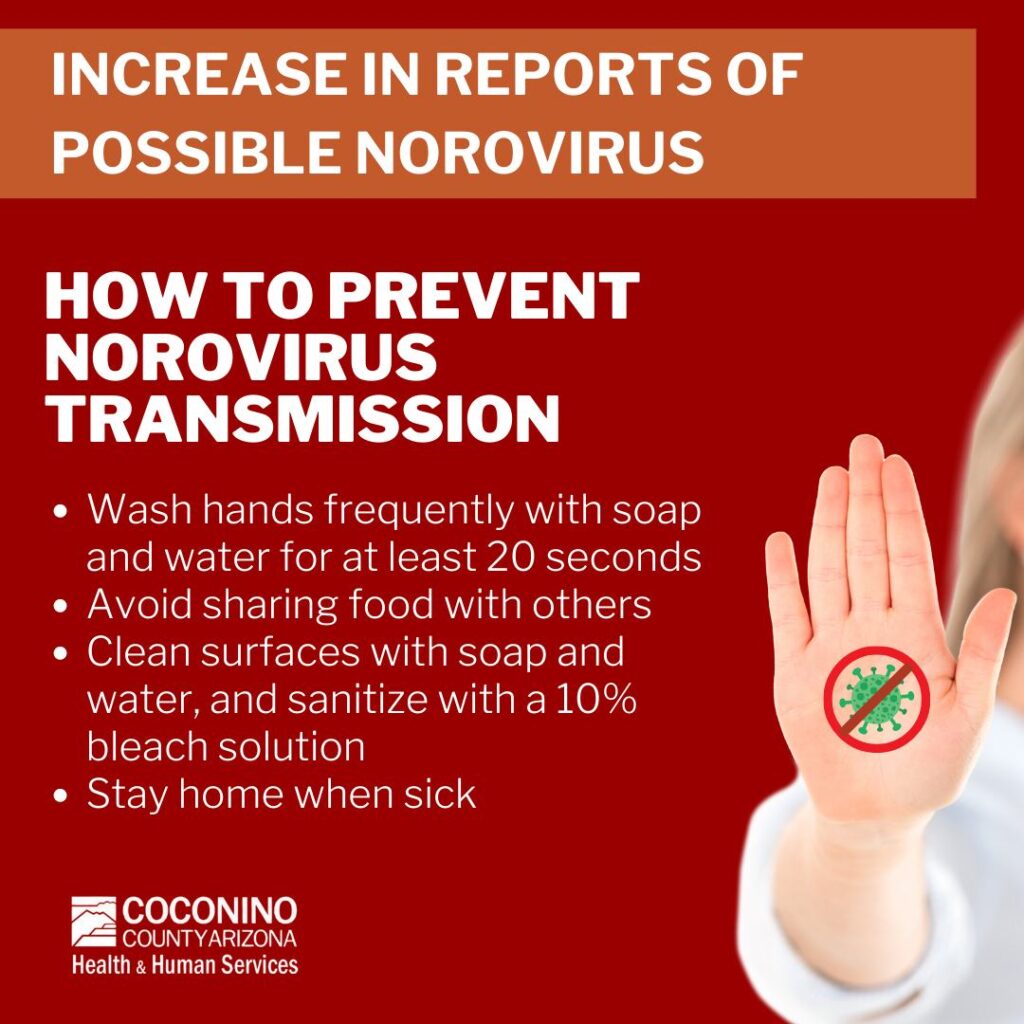 COCONINO COUNTY — Coconino County Health and Human Services (CCHHS) has recently received an
COCONINO COUNTY — Coconino County Health and Human Services (CCHHS) has recently received an
increase in the number of reports of gastrointestinal illness consistent with norovirus.
Symptoms of norovirus include nausea, vomiting, diarrhea, abdominal pain, headache, body aches, and mild fever.
CCHHS is investigating the circumstances surrounding the illnesses and is encouraging individuals to take precautions to prevent infection.
An individual can help prevent norovirus transmission through the following actions:
- Wash hands frequently with soap and water for at least 20 seconds. If soap and water are not readily available, an alcohol-based hand sanitizer that contains at least 60% alcohol can be used. Hand sanitizers aren’t as effective as washing hands with water and soap at removing norovirus particles.
- Avoid sharing food or drinks with other people, especially when you’re sick or they’re sick.
- If ill, stay hydrated and contact your healthcare provider with concerns or if symptoms worsen.
- When sick, limit interaction with other people as much as possible to prevent further spread and do not prepare food or care for others.
- Clean surfaces with soap and water and sanitize with a 10% bleach solution to kill norovirus. Launder soiled clothing in hot water promptly.
 Norovirus spreads very easily, including through direct contact with an infected person, touching a surface or object contaminated with norovirus, or eating food or drinking liquids contaminated with norovirus. Norovirus can be found in an infected person’s vomit or feces (poop) even before they experience symptoms. The virus can also stay in feces for two weeks or more after symptoms resolve. It is important to continue frequent hand washing during this time.
Norovirus spreads very easily, including through direct contact with an infected person, touching a surface or object contaminated with norovirus, or eating food or drinking liquids contaminated with norovirus. Norovirus can be found in an infected person’s vomit or feces (poop) even before they experience symptoms. The virus can also stay in feces for two weeks or more after symptoms resolve. It is important to continue frequent hand washing during this time.
Symptoms typically begin 24 to 48 hours after exposure to the virus. A very small amount of virus can make someone sick.
Norovirus illness is often mistakenly called “stomach flu,” although norovirus is not related to influenza. Influenza is a respiratory illness, with symptoms that include high fever, chills, body aches, sneezing, runny nose, sore throat, and/or coughing. Norovirus is not a respiratory illness and is not spread through breathing or coughing.
According to the Centers for Disease Control and Prevention (CDC), norovirus is the leading cause of illness and outbreaks from contaminated food in the United States. Norovirus outbreaks frequently occur in settings where people live in close quarters and can easily infect each other and many of these outbreaks occur in food service settings.
Although the symptoms may be severe, norovirus rarely causes serious illness or death. There is no specific medicine to treat people with norovirus illness. Individuals with norovirus symptoms should drink plenty of liquids to replace fluid lost from throwing up and diarrhea to prevent dehydration. If you or someone you are caring for is severely dehydrated or has concerns, contact your healthcare provider.
For more information visit https://www.cdc.gov/norovirus/about/index.html.
